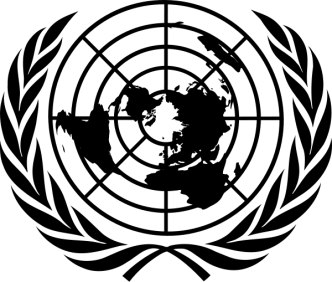
The United Nations (UN) is an intergovernmental organization which aims to promote cooperation between all the nations of the world. Since the UN aims to promote harmony and fair dealings between its members, it is generally not thought of to be controversial.
United Nations is also the name of a band formed in 2005 by Geoff Rickly, former lead singer of the band Thursday. United Nations, the band, served as an outlet for Rickly’s increasing interest in creating more extreme and abrasive sounds, none of which were compatible with his main band’s image after it signed with a major label and his bandmates began pressuring him to write more commercial material. The stated goal of United Nations at its inception, was to viciously parody American society and attack rock ‘n’ roll itself. Rickly and company lashed out at deserving targets like capricious politicians, phony spirituality, white privilege, and neo-liberal economic policies, while doing everything in their power to alienate traditional rock fans. For instance, the band’s first album reproduced the cover to The Beatles’ Abbey Road (without permission of course), wherein the fab four were depicted engulfed in flames as they attempted to cross the iconic English street. To the casual observer, it might seem that the least controversial part about United Nations is their name.
The UN and United Nations (the band) could not be more different, in either their visibility or ambitions. It seems absurd that anyone could conflate the two. And yet, in 2008, Rickly’s band found that their Facebook page had been taken down pursuant to a cease and desist letter. A few days later, the band’s Myspace page was taken down as well. The UN was attempting to enforce its trademark against the band, and it was not interested in holding a summit to discuss its terms.
Rock ‘n’ roll is known for pushing the envelope and challenging authority, and intellectual property laws are no exception. Johnny Cash was sued for using the lyrics and melody from the song “Crescent City Blues,” when he wrote “Folsom Prison Blues.” Ray Parker Jr. was accused of ripping off the mercifully forgettable Huey Lewis and the News when his theme to Ghostbusters sounded a little too close to “I Want a New Drug.” Even George Harrison was hauled in to court for infringing “He’s So Fine” by the Chiffons, written by Ronnie Mack. Clearly, musicians have earned a spotlight in copyright law by using, borrowing, and modifying melodies throughout rock’s storied half-century or more on the planet. Usually when a musician finds her/ himself accused of violating intellectual property rights, it is in connection with their songs, or even album cover art- work.
What Rickly found himself embroiled in back in 2008 was much different than the controversy he had clearly been courting. It appeared that the UN did not like sharing their name and seal with the rock band. The Lanham Act, under Section 43, permits a party with a recognized trade- mark to prevent others from using that same mark in commerce. An action against an alleged infringer is aimed at preventing a false designation of origin in the interest of protecting consumers from fraud and abuse. This type of analysis is one which considers the totality of circumstances in balancing factors such as the strength of the prior mark, similarity between the prior mark and the mark which allegedly infringes it, the similarity of goods and services offered, the trade channels which the mark is used in, the nature of the purchase of each product, consumer sophistication, and any actual confusion which can be demonstrated. No single factor is determinative and all must be considered in order to find that an infringement occurred in the form of a likelihood of confusion between the origins of the two products. For example, a soda pop brand and a line of baby bibs may both exist in the market under the name “Burp,” even though they are manufactured and distributed by two separate companies. Since the products are dissimilar enough, it is unlikely that consumers will confuse one product for the other. The UN can clearly use their name to promote their services on the world stage with a valid and distinctive mark, but they would be hard-pressed to shut down an underground rock band with the same name on the basis that anyone would confuse the two.
Six years on from the initiation of the infringement action which temporarily decimated the band’s social media presence, they are still playing shows and releasing records. The latest of which, Four More Years, proudly displays the UN’s cease and desist letter on its cover. The band continues to have functioning pages on Facebook and Twitter. The UN had expended its time and capital on a trademark infringement action which was not justified and which was not winnable. Neither party settled the dispute. Rather, over time, the problem simply went away.
The experience, while not financially or legally consequential, opened up an existential scab for the band which has yet to fully heal. The question of what the impact of their music is, if it poses no real threat to authority, is examined in the song “United Nations v. United Nations” off of Four More Years. Rickly explained in an interview with Noisey that the song is “kind of about [the UN] coming after us, and it also about us pretending to fight the man… That’s kind of a lot of what [our band] has become about, it’s self-critique.” The void left by the struggle with an authority that views them as inconsequential is something that the band continues to explore through their music. They continue to examine and nurture systems of values outside of mainstream commerce and politics, but the realization they might not have the impact that they once imagined is now part and parcel to their fight. Trademark law does not hold the answers to these deeper questions over politics, the roles we may play in society, and the impact of art. It only provides a means for designating origin and source in commerce. Crises over purpose and relevance are left up to each individual to re- solve on their own.
In one sense, this is a happy ending. Trademark trolling can be common amongst large institutions who seek to zealously protect their brands. Sometimes cease and desist orders are distributed scattershot in the hopes that parties with nominally similar marks will change them in order to avoid the large legal fees necessary to defend their rights. In the case of Rickly’s band, the worst consequence was the resignation of their publisher, who left out of fear that the UN would investigate his recreational drug use.

By Colleen Ferguson and Michael Reed